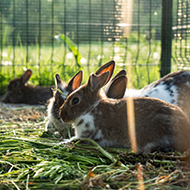Rabbit welfare letter gains 1,600 signatures

"Ultimately, we want to see the Good Practice Code for rabbits' welfare in England enshrined in law" - Dr Suzanne Moyles.
More than 1,600 people have signed a letter in support of a Good Practice Code for rabbits' welfare in England.
Created by The Rabbit Awareness Action Group (RAAG), the Good Practice Code has been circulated among veterinary professionals, and aims to improve welfare for rabbits in England by ensuring that the five welfare needs are met.
Highlighting the five welfare needs, environment, diet, behaviour, companionship and health, the letter reads: “RAAG recognises that although Rabbit Awareness Week (RAW) has achieved a great deal, rabbits remain one of the UK’s most owned, but least understood animals, and should be high on the agenda year-round - something echoed by the recent launch of the first Good Practice Code for the Welfare of Rabbits by UK Government.”
After describing the five welfare needs that the RAAG is campaigning for, the letter continues: “We are inviting all owners, and retailers, to join us in helping to raise awareness of the five key welfare needs of pet rabbits. By signing and/or sharing this letter you are showing your support in helping to meet rabbits’ needs, enabling them to live a life they deserve.”
Dr Suzanne Moyes, RAAG member, said: “Although we are delighted with the support we have received since the formation of RAAG, we can’t afford to rest on our laurels.
“The pandemic has seen rabbits’ popularity as a pet increase, but sadly, their five specific welfare needs are often overlooked. These include many rabbits living alone with little stimulation in woefully inadequate housing, and being fed incorrect diets, which can lead to numerous health problems.
“RAAG members intend to build on the group’s early achievements with a series of initiatives planned from early next year, which include using RAW 2022 as a platform to encourage even more owners, retailers, rescues and veterinary practices to sign up to the Code.
“Ultimately, we want to see the Good Practice Code for rabbits’ welfare in England enshrined in law as a framework upon which all owners and key groups, such as retailers and rescues, can build their practices around to ensure a bright future for these delightful creatures.”



 The BSAVA has opened submissions for the BSAVA Clinical Research Abstracts 2026.
The BSAVA has opened submissions for the BSAVA Clinical Research Abstracts 2026.